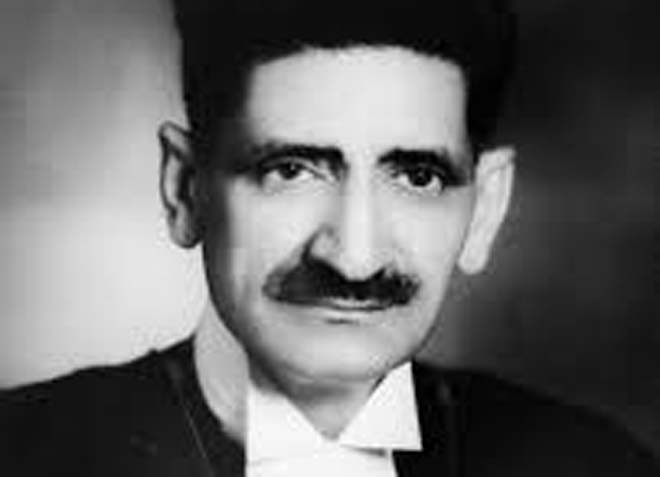

Somehow making serious speeches has been rendered out of vogue. Even on serene and solemn occasions as university convocations, the chief guests usually shirk from spending a few ‘precious’ moments to contemplate about the contents and substance of the ‘august’ speech they will deliver. Even the ministers of Education or the governors are not cognizant of the fact that words uttered on such occasions are sacrosanct, teeming with meaning and purpose.
Without such realisation, the usually incoherent and ill-articulated ramblings of the chief guests must be serving as instruments of torture for all poor souls who are listening, (late) Justice Muhammad Rustum Kayani being the most conspicuous of them. I will come back to Justice Kayani later. Just to warn you, if the minister of education and the governor (who is ex-officio chancellor of the university) can come to the convocation and ramble, I too can do the same at this function which is much smaller in scale as well as prestige.
Allusion to Justice Kayani is important because the motivation for this speech was drawn from him. I hope I am not committing any insolence if I assert that the talents of speech-making of ministers and governors, which I am trying to emulate, would make Justice Kayani’s soul convulse restlessly in his heavenly abode. Justice M.R. Kayani the immensely respected Judge of the West Pakistan High Court was also known for his speeches delivered at different places that "constitute a perpetual song, in an articulate harmony of thought and form". He had an unstinting belief that "an unrestrained flow of expression and opinion, like a breeze from an open window, is the birth right of man". Indeed Justice Kayani’s unforgettable pronouncements "sprang from the spontaneity of an artless soul".
S.M. Murshid, the Chief Justice East Pakistan, was spot on in his comments about Justice Kayani: "His speeches were superb and his writings had the range of genius in them. They will always exercise an imperishable authority over the minds of those who can discriminate between right and wrong." It indeed needed an inexhaustible fund of courage to say about the military form of government, in front of Ayub Khan, "At the best of times, it is only an apology to the rest of the world and a necessity in the country itself, and it should not last longer than is necessary. And while it lasts, let some method be devised by which people can cough out the disagreeable fluids which irritate their system."
Dear students, he was a great man, full of courage whose memory has outlived his life. He was a Ravian in the true spirit of the word and more so the resident of this hostel who loved all that the New Hostel had on offer. Except perhaps the food cooked by Muhammad Din bavarchi (the cook) whose dexterity as a cook enabled him to make pea curry taste like cauliflower mixed with meat (Gobhi-Gosht).
Leaving the noble soul of Justice Kayani aside for a moment, here I want to draw your attention to a different sort of a quandary which I found myself unable to resolve.
To all intents and purposes, this site of your residence cannot by any means be designated as a hostel. Traditionally, hostel means a sociable accommodation where guests can rent a bed, in a dormitory and share a bathroom, lounge and sometimes a kitchen. It is only in India, Pakistan and perhaps South Africa where hostel also refers to boarding schools or student dormitories in resident colleges and universities. In other parts of the world, the word hostel mainly refers to properties offering shared accommodation to travellers or backpackers. To my reckoning this should be a boarding house.
Ironically, New Hostel has a rich and multi-dimensional history which is yet to be documented. Its literary dimension is more pronounced. Many poets and prose-writers honed their literary skills while they spent their formative years here. Sufi Ghulam Mustafa Tabasum (1899-1978) was the superintendent of this hostel who had a tremendous role in shaping Faiz Ahmad Faiz’s talents. Sufi Sahib, undoubtedly, possessed a razor’s edge intellect. Great intellect must be wedded to a great soul and, in his case, there was an exceptional alliance of a sharp mind with a mellow and mature soul.
Many such personalities had the privilege to live here. To cultivate your cultural self, New Hostel provides the perfect ambience. It must pride itself to have Hargobind Ghurana and Abdus Salam as its alumni -- two larger-than-life figures, the likes of whom are not born very often.
Boarding houses are the sites to forge social connections and a sense of camaraderie among peers. They offer abundant opportunities to instill inter-personal skills and become self-sufficient. All of you must take full advantage of it. Generally, it is noticed, the boarders have well-rounded and far more complete personalities than day-scholars. Thus, you people have an edge over your university fellows who could not experience the life of a boarder.
Leaving aside the contentious issue of whether it should be called a hostel or a boarding house, another fact which seemed quite interesting to me is that ‘hostels’ as we know them don’t have very long and lively history. It is just a 20th century phenomenon. One may surmise that the establishment of the New Hostel was not a belated affair. Its earth-breaking came about in 1921 only nine years after the world’s first ever hostel was established in 1912 at Altena Castle in Germany.
New Hostel has witnessed many an ebb and flow of history and contributed enormously by infusing civilization into many raw ‘specks of eternity’. In its own right New Hostel is a phenomenon which deserves our gratitude. May it last forever.